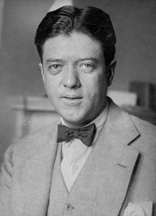Robert M. La Follette, Jr.
| Robert M. La Follette Jr. | |
|---|---|
 |
|
|
United States Senator from Wisconsin |
|
|
In office September 30, 1925 – January 3, 1947 |
|
| Preceded by | Robert M. La Follette Sr. |
| Succeeded by | Joseph McCarthy |
| Personal details | |
| Born |
Robert Marion La Follette Jr. February 6, 1895 Madison, Wisconsin, United States |
| Died | February 24, 1953 (aged 58) Washington, D.C., United States |
| Nationality | American |
| Political party |
Republican Wisconsin Progressive Party |
| Spouse(s) | Rachel Wilson Young |
Robert Marion "Young Bob" La Follette Jr. (February 6, 1895 – February 24, 1953) was a U.S. senator from Wisconsin from 1925 to 1947. As an outspoken son of Representative, Senator, and Wisconsin Governor Robert M. La Follette Sr., co-founder of the Progressive Party and ally of the Farmer-Labor Party in adjacent Minnesota, La Follette kept the Progressive Party alive in the US Senate until his defeat by Joe McCarthy in 1946.
La Follette was born in Madison, Wisconsin, the son of Robert M. La Follette Sr. and Belle Case La Follette. He attended the University of Wisconsin–Madison from 1913 to 1917 but he did not graduate because of illness. (He received the honorary degree of LL.D. from the University of Wisconsin in 1938.) The same illness kept him out the military during World War I. La Follette served as his father's private secretary between 1919 and 1925. He married Rachel Wilson Young in 1930; they had two children, Joseph Oden La Follette and Bronson Cutting La Follette. La Follette had two siblings, Philip La Follette and Fola La Follette.
La Follette was elected as a Republican to the United States Senate on September 29, 1925, to fill the vacancy caused by the death of his father. "Young Bob," as he was called, was a champion of organized labor. He gained national prominence between 1936 and 1940 as chairman of a special Senate investigating committee, commonly called the La Follette Civil Liberties Committee, that exposed the surveillance, physical intimidation, and other techniques used by large employers to prevent workers from organizing.
...
Wikipedia
